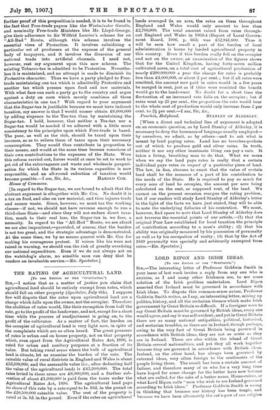THE RATING OF AGRICULTURAL LAND.
[To THE EDITOR OF THE " SP ECTATOR:9 SIE,—I notice that as a matter of justice you claim that agricultural land should be entirely exempt from rates, which should fall on other property (Spectator, July 6th). I suppose few will dispute that the rates upon agricultural land are a charge which falls upon the owner, not the occupier. Therefore the abolition of rates would, like their exemption from half the rate, go to the profit of the landowner, and not, except for a short time while the process of readjustment is going on, to the profit of the cultivator. As a matter of fact, the burden on the occupier of agricultural land is very light now, in spite of the complaints which are so often heard. The great pressure of rates is urban and on house property, not on that property which, even apart from the Agricultural Rates Act, 1896, is rated for urban and sanitary purposes at a fraction of its value. But taking rural areas where the bulk of agricultural land is situate, let us examine the burden of the rate. The rateable value of rural districts in England and Wales is about 2.53,500,000, and the assessable value (i.e., after deducting half the value of the agricultural land) is 243,200,000. The total rates levied in these areas are £8,000,000, and a further sub- vention of about 21,000,000 is paid from the taxes under the Agricultural Ilates Act, 1896. The agricultural land pays its share of this rate by a rate equal tole. 10d. in the pound on the 220,500,000 rateable value. The rest of the property is rated at 3s. sa. in the pound. Even if the rates on agricultural lands averaged 2s. an acre, the rates on them throughout England and Wales would only amount to less than £2,700,000. The total amount raised from rates through- out England and Wales in 1903-4 (Report of Local Govern- ment Board, 1906, p. 663) was 252,941,000. Thus it will be seen how small a part of the burden of local administration is borne by landed agricultural property in this country. Even if this burden really fell on the occupier and not on the owner, an examination of the figures shows that for the United Kingdom, having forty-seven million cultivated acres, on a total cost of agricultural production of nearly 2200,000,000 a year the charge for rates is probably less than 24,000,000, or about 2 per cent. ; but if all rates were remitted, the amount now paid in rates would in a few years be merged in rent, just as if tithe were remitted the benefit would go to the landowner. No doubt for a short time the fluctuation of an increased rate falls on the occupier ; but if rates went up 25 per cent., the proportion the rate would bear to the whole cost of production would only increase from 2 per cent. to 24 per cent.—I am, Sir, Sz.c., [When a direct and technical line of argument is adopted on an economic question, as by Lord Stanley of Alderley, it is necessary to drop the looseness of language usually employed— by ourselves, we admit, as by others—and to ask what is meant by land paying rates. Land has no breeches-pockets out of which to produce gold and silver coins. In truth, neither it nor any other inanimate thing can pay a rate. It takes a living, breathing man to do that. What we mean when we say the land pays rates is really that a certain individual pays rates in respect of a particular piece of land. The law, in fine, chooses to enact that the value of certain land shall be the measure of a part of his contribution to the needs of the State. He is required to pay so much for every acre of land be occupies, the amount per acre being calculated on the rent, or supposed rent, of the land. We cannot on the present occasion reargue the rating problem, but if our readers will study Lord Stanley of Alderley's letter in the light of the facts we have just stated, they will be able to note the underlying fallacies of his contention. We must, however, find space to note that Lord Stanley of Alderley does not traverse the essential points of our article,—(1) that the original Poor Law established for local taxation the principle of contribution according to a man's ability ; (2) that his ability was originally measured by his possession of personalty as well as by his occupation of realty ; (3) that by the Act of 1849 personalty was specially and arbitrarily exempted from rates.—En. Spectator.]






































 Previous page
Previous page